Meet the Artist: Corbetta and the Maid by Tim Herrmann
Tim Herrmann joins the Julie, Monster production as an engineer by day and a creative for life. A prolific self-produced singer-songwriter, and a dancer who hasn't met a style of movement he wouldn't try once, when not onstage he can be found writing queer protest music under the name Ruckus Aquinas, re-contextualizing styles of dance in new and interesting ways (sometimes with the assistance of a sturdy 6" platform heel), or debating the most socially responsible manner in which to wield the data science and machine learning tools that are becoming a ubiquitous and influential component of our modern lives. Within the show of Julie, the theme of simultaneously embodying multiple things that society would otherwise deem incompatible with one another is one that Tim understands intimately.
We interviewed Tim about his roles:
Tim, you play two main characters (and several others) in Julie, Monster. How do you approach making Corbetta and the Maid different in the eyes of the audience?
Well, that differentiation is made easier by the manner in which each channels a different facet of my expressive skillset. The sonorous Corbetta pulls from my singer-songwriter experience to project a loud and flamboyant persona. The nurturing Maid, in sharp contrast, relies more heavily on my body language and nonverbal talents for conveyance of her character. This process-oriented separation allows me to construct each character out of different tools, separating them at the point of conception.
How did you hear about Julie, Monster and why were you interested?
That's a funny story, really. During the pandemic I started working on a pet project of re-imagining Shakespeare sonnets as punk rock songs. I offered the first one I recorded as social media content for Quill Theatre and it ended up posting to Quill’s page around the same time that Quill posted an audition notice for Julie, Monster on behalf of RVA Baroque. Being a gay man and a francophile with an insufferable thirst for creating original works of art, the nature of Julie Monster itself was simply an irresistable opportunity to bring so much of what I love together for a single show and toss in a little subversiveness to bind it all together.
You have had a few weeks of rehearsals under your belt. What has surprised you? What did you expect?
Hitting the ground running during rehearsals is an expectation that I'd certainly say has been met. And while I was expecting the development and rehearsal of this work to be conducted in an inclusive space, I have been pleasantly surprised by both the effort and intentionality of pursuing and nurturing that inclusivity.
Who do you hope shows up to see Juile and what do you hope they take away from the show?
I would love for marginalized individuals to have the opportunity to see themselves in an art form that, historically, has rarely offered that at all, let alone as boldy and explicitly as it is in Julie.
Who will be cheering you on from the audience or the on-line screens?
My loving and patient husband will be present at opening night to finally see what all those late rehearsal nights helped to realize, while the rest of my family will be digitally cheering from afar. I'm anticipating that for the latter, this experience will be both familiar and strange in comparison to the VHS opera recordings that were part of my ubiquitously-musical childhood (I still find it quite funny that in a family with two voice majors, it's the engineering major who will be the first to originate a role in an opera)
Tim Hermann, who played Corbetta

